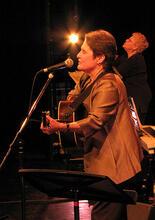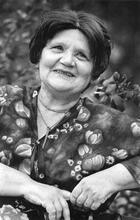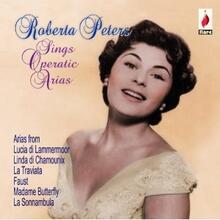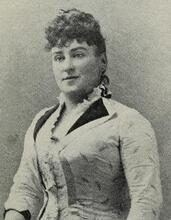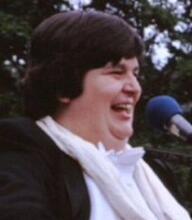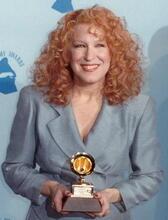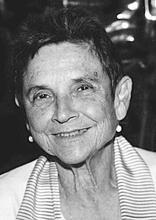Mahinarangi Tocker
Highly regarded Māori singer-songwriter Mahinārangi Tocker's Jewish heritage was an essential component of her identity and her music. Born in 1955 to a Jewish father and a Māori mother, Tocker grew up with a wealth of music; she began writing music at the age of seven and performing at ten. Over the course of her career, she wrote over 600 songs and released five albums. Her final album, The Mongrel In Me, was most inspired by her mixed Jewish, Māori, and Celtic heritage; she famously described the album as “a hāngi served on a bagel with a side order of haggis.” Tocker died suddenly of an asthma attack at the age of 52.
Introduction
New Zealand singer-songwriter Mahinārangi Tocker performing “Her Song,” Auckland, 1988. Courtesy Slydogmania via YouTube.
In March 2018, a decade after the death of prominent Māori songwriter and musician Mahinārangi Tocker, a who's who of New Zealand female musicians took to the stage for two nights during the Auckland Arts Festival to commemorate a woman who was renowned for her distinctive musical style and heartfelt, powerful songs. The tribute concert was a special celebration of the legacy of a complex but much-loved musical artist whose life had been cut short suddenly, at just 52, by an asthma attack.
While Tocker was well known as a Māori singer-songwriter, it was not widely known (including among the Jewish community) that father was Jewish, and that her Jewish heritage played a significant part in her life and her identity. As such, she is one of a number of significant Māori-Jewish creative figures. Contemporary examples include artist Lisa Reihana and filmmaker Taika Waititi (mother's surname: Cohen). Although their Jewish backgrounds might be more widely recognized, Tocker spent far more time openly considering and reflecting on what it meant for her personally and creatively. In both her music and in interviews over the years, she referenced and explored the Jewish part of her background and its meaning for her. She was conflicted in her feelings about Israel but, at the same time, fiercely proud of her heritage.
Family and Early Life
Tocker's parents met after her father, Norman, joined the kapa haka (Māori performance art involving song and dance) group at the teacher's training college he was attending and fell "in love with things Māori," according to Radio NZ. He ended up marrying her mother, Rihitapuwai Rauhihi. The union of the two meant that Tocker, who was the fourth of their eight children, was of Ngāti Raukawa, Ngāti Tūwharetoa, and Ngāti Maniapoto descent through her mother, and Jewish with Celtic ancestry through her father.
Tocker was born in Taumarunui, a regional town in the central North Island of New Zealand, in 1955. With both her parents involved in kapa haka as she was growing up, traditional Māori music was a formative influence on her musical development. But her background was a generally musical one. In an interview with the New Zealand Jewish Chronicle in 2005, she said she grew up with a wealth of music: "We had a piano and not much else. And on Friday nights Dad would come home with new music for us to listen to. He used to play me Cilla Black and music to cry to. I’m very proud that he realised the importance of sound to me.” Indeed, she said that “music and words have always been my best friends – even when I was very little” (Chronicle, 2005).
Tocker began giving life to those constant companions when she was very young: she started writing music when she was seven and performing when she was ten. While still a teenager, she became the first person to get a busking license in Taumarunui and she continued learning, composing, and performing music for the rest of her life. However, she also trained as a nurse before leaving New Zealand to travel for several years.
Exploring her Mixed Heritage
Tocker’s curiosity about her Jewish heritage prompted her to go to Israel as part of her travels, although in 1985 she told Broadsheet that the visit coincided with a difficult period in her life when she was still sorting out who she was and also acknowledging her sexuality. Tocker later said it highlighted her confusion about identity, but "it was a good way of writing a lot of music," Radio NZ reported in 2018.
One of her well-known songs, “No Lines On My Face,” was written in Tiberias, sitting by the Sea of Galilee. It appeared on her first album Clothesline Conversation, which was recorded on her return to New Zealand in 1982 and marked the official beginning of her musical career.
Over the next 26 years, the famously prolific Tocker wrote more than 600 songs and released another five albums of original material. Her vocal style was often compared to that of Joan Armatrading and Tracy Chapman. Respected New Zealand periodical The Listener named one of her albums, Mahinārangi (1996), as one of the top 10 New Zealand albums of the twentieth century.
Tocker’s fifth album, Hei Ha! (2002), earned her a finalist spot in the inaugural Māori Writers of Song award at the 2003 APRA Silver Scroll Music Awards. The album was also a finalist in Te Mana Māori section of the NZ Tui Music Awards that year.
But it was her final album, The Mongrel In Me (2005), a classic of its type, that was most inspired by her mixed Jewish, Māori, and Celtic heritage. Tocker memorably described it, in the publicity for album, as “a hāngi served on a bagel with a side order of haggis.” The double album was a 29-song collection about love, loss, desire, and heritage, which struck a balance between vocals in Māori and English. Written and produced by Tocker, it also featured collaborations with a stellar line-up of noted musicians. “It’s a mix of waiata, Māori and Pakeha with emotions of Hebrew, Celtic and Māori sounds. But it is not about writing about these things, it is about who I am,” she told the New Zealand Jewish Chronicle in the 2005 interview.
Identity and heritage were important to Tocker, and in her music she tried to express and reflect the many different aspects of her background that made her who she was. “I wanted to show who I am and how all the dots join up. Music and writing about it helps the dots grow finer. There are a lot of people who try to tell me how to be Jewish, Māori or lesbian—but they only see a part of me, not all parts of me” (Chronicle, 2005).
Tocker’s learning and cultural identification often came through music, she said (Chronicle, 2005). This led her to realize the commonalities between Jewish and Māori culture. She gave the example of concepts of whanau (family), something that became evident to her during her time in Israel where life on a kibbutz reminded her of being on a marae (a communal and sacred meeting ground).
"There are many similarities between Jews and Māori. It’s all about how you can turn humour into grief—and how you can turn grief into humour” (Chronicle, 2005). Tocker thought that was why she got along so well with other Jewish musicians she knew. “They understand humour in a way that reaches people’s hearts: it is because they understand sadness as well—and music brings it all out. Jewish music is from the heart: it’s full of whanau concepts and a handing down of tradition” (Chronicle, 2005).
Awards and Legacy
Tocker toured constantly, both domestically and internationally, throughout her career. But she did not just play concert tours and at music and arts festivals, she also made a point of performing for schools, colleges, and community groups too. On top of her musical output, which included many collaborations with fellow musicians, she gave lectures around New Zealand about the use of music and creativity to boost learning and self-esteem. Tocker was also an adult literacy tutor and a writer and poet (with several published books to her name), and she delivered an award-winning performance in the film A Small Life (2000).
Always deeply committed to the issues she believed in, Tocker was a prominent and revered figure in New Zealand's gay community. She was "a champion of diversity" and a keen supporter of New Zealand events like the Big Gay Out and the Candlelight Memorial, Mark Henrickson of the New Zealand AIDS Foundation said after her death.
New Zealand singer-songwriter Mahinārangi Tocker in “Like Minds, Like Mine,” a New Zealand public education program aimed at reducing the stigma and discrimination faced by people with mental illness. Courtesy Like Minds Like Mine via YouTube.
Another issue Tocker was passionately committed to was mental health. She herself was diagnosed with depression in the 1990s, and that led her to became one of the faces of a national awareness campaign aimed at destigmatizing mental illness in the early 2000s. Later on, she worked at the Mental Health Foundation as a trained facilitator in workshops about human rights issues for those who had experienced mental illness.
Tocker’s musical talent earned her widespread recognition and accolades, while her work on various social causes earned her a special place in the nation's heart as a taonga (treasure). In 1999, at the request of the then-incoming Prime Minister Helen Clark, she performed at the opening of Parliament. She was named Queer Musician of the Year in 2001 and she was made a Member of the New Zealand Order of Merit for services to music in January 2008.
Choir performing cover of Mahinārangi Tocker’s “Love Me as I am” and Hinewairangi Tocker, Kīmai Tocker, and Huirangi Tocker performing Tocker’s “Ko Te Nau Pararahi” at Mahinārangi Tocker tribute concert, Auckland Arts Festival, 2018. Courtesy SOUNZ Centre for NZ Music via YouTube.
Tocker died suddenly on April 15, 2008, following a severe asthma attack. She was just 52 and left behind her partner and her daughter, Hinewairangi Tocker-Fenton.
"Artist walked tall through two sounds., NZ Herald, April 19, 2008.
Bell, Miriam. "The music in her." NZ Jewish Chronicle, February 2004.
"Celebrating 'super hero' songwriter Mahinaarangi Tocker 10 years on." Radio NZ, April 15, 2018.
Creative NZ tribute for Mahinaarangi Tocker on The Big Idea [website], April 17, 2008.
Dickson, Sandra. "Mahinaarangi Tocker." Memorial blog on Lower Hutt Women's Centre website, May 2008.
GayNZ.com [website] tribute to Mahinaarangi Tocker, April 16, 2008.
Gunn, Liz. "Love me as I am: Celebrating the songwriting of Mahinaarangi Tocker." 13th Floor [website], March 17, 2018.
Hutching, Matthew. "REVIEW: Love Me As I Am - the music of Mahinaarangi Tocker.” Radio NZ, March 17, 2018.
"Life and work of Mahinaarangi Tocker acknowledged." NZ Government, April 16 2008.
"Mahinaarangi Tocker, one of our best." STUFF [website], December 15 ,2009.
Mahinaarangi Tocker biography on Muzic.net.nz [website], no date.
"NZ Singer Tocker dies." Billboard, April 17 12008.
Oakenstar, Jess Hawk. “A Clothesline Conversation.” Broadsheet, November 1985.
"Obituary: Mahinaarangi Tocker." STUFF [website], January 31, 2009.
"Shona Laing on her friend and collaborator Mahinaarangi Tocker,” Radio NZ, March 17, 2018.
Yates, Charlotte. Mahinaarangi Tocker profile. Audio Culture [website], March 7, 2019.

